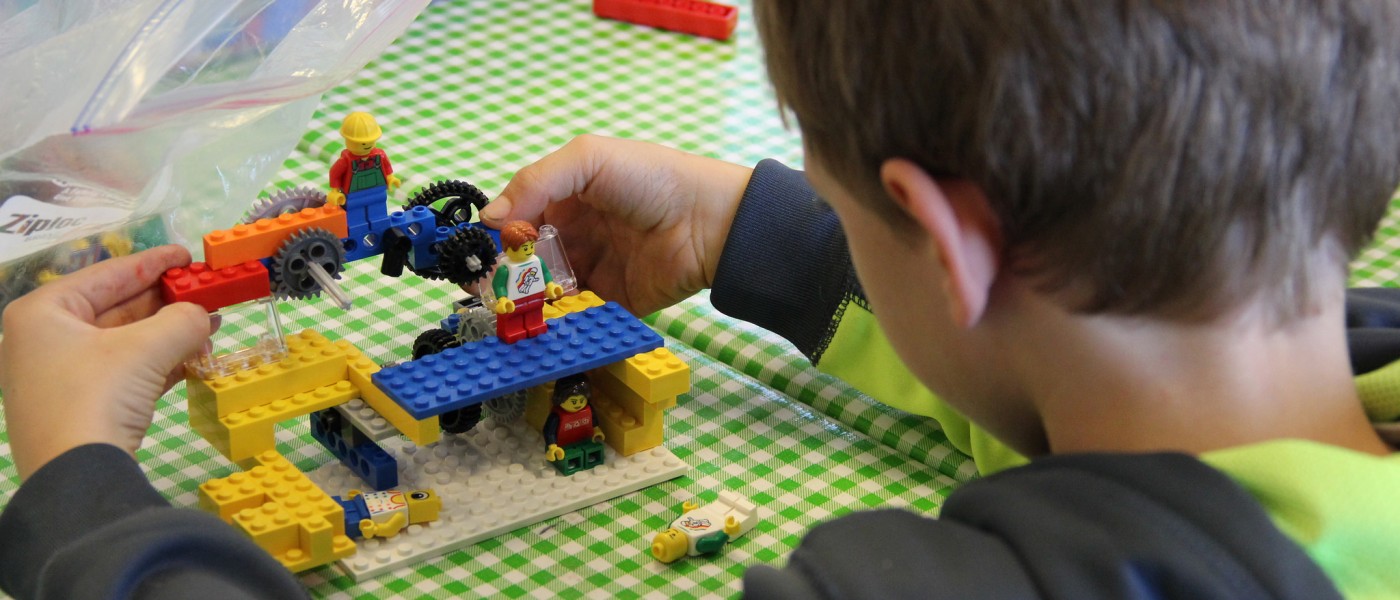Your Child Has Multiple Speech Language Goals – What to do!
Once you’ve had your child assessed for a speech or language disorder and you’ve been told of the various goals that need to be targeted, you might find yourself throwing your hands in the air, baffled as to where to begin. It can certainly be overwhelming to wrap your head around a comprehensive treatment plan for your child. What speech language goals should be targeted first? And, how can I, a motivated parent, get involved? This post is dedicated to empowering parents in becoming more active partners in both the selection and implementation of appropriate goals for your child’s treatment plan. By understanding the rationale for as well as tips for how to best target each goal, in terms of overall child language development, you can be better equipped to support your child and help move him or her through these goals more efficiently.
Photo: LEGO Club at Garfield Park by Santa Cruz Public Libraries
Start with Your Child’s Evaluation Report
Start with a thorough discussion with your child’s speech therapist. When your child is evaluated, make sure you understand every word of the accompanying evaluation report. If there’s anything that’s unclear to you, don’t hesitate to ask your evaluating speech therapist for clarification. Also, focus on the final section of the report, which usually outlines the recommendations (to treat or not to treat) and the goals of speech-language therapy. The evaluating therapist will usually list these goals according to their developmental priority. In other words, the highest priority, or the most urgent goals are listed first whereas the goals that can be targeted in due time are listed next. Don’t be afraid to ask why these goals are listed first and how, once mastered, that will provide a big boost to your child’s overall language. This way, you will have a narrative of your child’s language development trajectory. I can’t emphasize enough the importance of this “story.” So much of what speech therapists do can be full of jargon and even downright intimidating. For example, “mastering the present progressive tense” can simply mean adding “-ing” to the end of verbs. And “phonological processes” are simply patterns of speech that make speech harder to understand. So make sure you understand, in the most straightforward of terms, what it is your therapist is doing to help your child.
Directly Access Your Treating Speech Therapist
In a good number of cases, the therapist who evaluates your child will not be the therapist who ends up treating your child. Assuming this is the case, it is important to coordinate the goals listed on your child’s evaluation with those that are actually initially targeted. It’s important to reconcile possible differences of opinion between these two professionals. Also, in some cases, some time may elapse between the evaluation report and the start of services. This can especially be true of services from a public payer, like your local Early Intervention (EI) program or school district. Also, as therapy progresses, stay updated with your child’s plan. I like to have the parents I work with “pick up the rear”. That means simply that I will introduce a new goal, work on it for a couple of weeks and then give specific instructions to parents to continue or reinforce this work. Make sure that your therapist is following a similar plan. Or, if that plan takes a different form, make sure he or she fully explains to you not only what you should do to follow up with therapy goals, but also why those goals are being targeted in the first place.
Advocate for “Dynamic Assessment”
This buzz word does come with some controversy. Simply put, dynamic assessment emphasizes mixing teaching and assessment together. While excessive assessment, particularly in the classroom, may not be such a wonderful idea, it can be very helpful in a one-on-one or group speech therapy regimen. In dynamic assessment, the therapist is conducting relatively frequent but usually informal assessments to see how the child is progressing. The idea here is that goals change and like the child himself or herself, the plan for treating that child’s speech and/or language child is “alive” and constantly evolving.
Dynamic assessment has the advantage of avoiding a serious pitfall in therapy, which is targeting stale goals, or goals that a child has already mastered.
I recommend that you press your therapist to periodically conduct these assessments to really know where your child stands. It will also give you and your therapist a full perspective on the longer term objectives, or, to keep “your eye on the prize.”
Get Educated!
Education is power. As much as possible, I’d urge you to verse yourself in the basics of your child’s specific challenge. Does your child’s challenge have to do with speech clarity? Or is it in processing language or in expressing himself or herself? This valuable resource from the National Institute on Deafness and other Communication Disoders (NIDCD) outlines typical speech and language developmental milestones, from birth through pre-school. Depending on the nature of the challenge, you’ll want to learn as much as possible about when it is expected that your child acquire specific sub-skills. These will give you a good sense of what should likely be prioritized in therapy. And while you will want to defer to your speech therapist, any extra set of eyes on this a very good thing.
Always keep in mind exactly what speech-language goal your therapist is actually targeting. This is especially true if the main challenge for your child is language-based. An important research study from 2004 examined the effectiveness of therapy that various speech and language challenges. I will only summarize the key points as they relate to how parents can and should be continually involved in their kids’ speech therapy program. If your child is focusing on language processing, the study’s results suggest that it is absolutely essential that your therapist actively involve you in a home-based therapy follow up program. In fact, in some cases, an informed and trained parent is just as effective in helping the child reach his or her language goals. The bottom line is, parent involvement in every aspect of therapy is critical. This is especially true for children who present with several goals in therapy.





